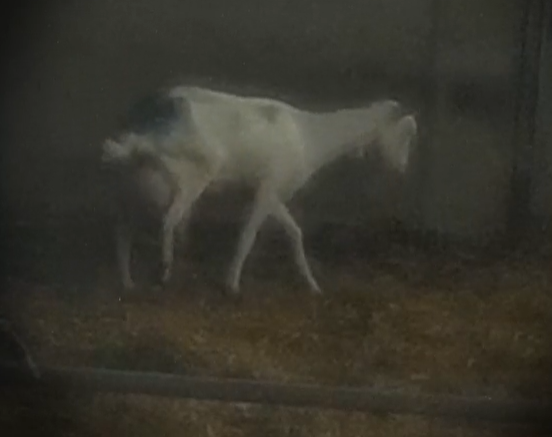Goats punched, hit, kicked and ‘left lame’ at farm supplying milk to Tesco, Sainsbury, Waitrose and Ocado, video shows
Exclusive: Tesco and Waitrose suspend brand after footage shows animals crying out in pain
Your support helps us to tell the story
From reproductive rights to climate change to Big Tech, The Independent is on the ground when the story is developing. Whether it's investigating the financials of Elon Musk's pro-Trump PAC or producing our latest documentary, 'The A Word', which shines a light on the American women fighting for reproductive rights, we know how important it is to parse out the facts from the messaging.
At such a critical moment in US history, we need reporters on the ground. Your donation allows us to keep sending journalists to speak to both sides of the story.
The Independent is trusted by Americans across the entire political spectrum. And unlike many other quality news outlets, we choose not to lock Americans out of our reporting and analysis with paywalls. We believe quality journalism should be available to everyone, paid for by those who can afford it.
Your support makes all the difference.Animals were subjected to a string of brutal attacks at a farm that sells goats’ milk to Tesco, Sainsbury’s, Waitrose and other supermarkets, footage from hidden cameras has revealed.
Goats were seen on video being punched, kicked, hit with a pole and slammed onto their backs at a plant that supplies St Helen’s Farm, in east Yorkshire.
The animals were also filmed crying in pain as they were held by their necks, had their ears tagged or their tails twisted.
Goat milk, yoghurts, cheese and ice cream sold by the St Helen’s Farm brand are the best-known goat milk products in the UK and are stocked by major supermarkets including Tesco, Sainsbury’s, Waitrose and Ocado. Demand has risen amid a switch away from cows’ milk in recent years.
Tesco immediately suspended the brand when shown the footage by The Independent. Waitrose and Booths, which has grocery stores around the north of England, followed suit.
About an hour’s worth of video was passed to the Surge animal rights group, which then showed it to a vet and to lawyers at Advocates for Animals, who it said “highlighted many serious issues”.
People filming using secret cameras told Surge that at one supply farm, they saw goats being:
- Kicked and punched
- Hit with a pole
- Held by the throat
- Having their tails twisted
- Shoved and roughly handled
- Left lame and struggling to stand or walk after the rough handling
Goats were also slammed onto their backs on a conveyor belt before their hooves were roughly trimmed, the video showed.
One was seen being dragged by one leg along the ground while struggling.
Animal suffering was also prolonged when injuries went untreated, the witnesses said after reviewing the footage.
The people behind the footage also reported seeing workers letting goats fall off an operating bed and become stuck between fences. In one case, a worker “played the drums” on a goat’s stomach after a procedure. The footage also shows farm employees dragging dead animals away in front of live ones, and Surge was told that dead and dying animals had been seen around the farm.
St Helen’s, which is a brand rather than a single farm, also buys goats’ milk from other farms in Yorkshire and the midlands. A spokesperson confirmed the footage was taken at one of St Helen’s supply farms, and as soon as the company was alerted by The Independent to the treatment of the animals, it cut off the supplier.
The Animal Welfare Act 2006 states animals, including farm animals, must be protected from pain, injury, suffering and disease.
Ed Winters, the co-founder and director of Surge, said: “St Helen’s is the most prominent and well-known goat company in the UK. They are regarded as being the best of the best when it comes to goat farming. But that means nothing to the animals.

“Goats are sensitive, curious and gentle animals, but the animal-farming industries treat them as commodities they can exploit for profit.
“St Helen’s say on their website the milk is a reward for looking after the goats and that their staff have a genuine interest and love for the animals. But it is obvious that the opposite is true at one of their supplying farms.”
He added: “These animals are thrown around and dragged and when they’re no longer producing enough milk to be considered profitable, they’re killed.”
Surge says about 50,000 mostly male dairy kids are slaughtered each year.
St Helen’s Farm told The Independent it was supplied by farms that were expected to comply with a rigorous code of conduct and that it had several animal-welfare accreditations, adding: “Today we have been made aware of allegations that one farm has infringed animal welfare standards, which we would find totally unacceptable if true.
“We have immediately ceased all milk supply from this farm and launched a full investigation to determine the facts of this matter.”
A Tesco spokesperson said: “We require high animal-welfare standards from all brands sold at Tesco, so these claims are deeply concerning. We have immediately suspended supply whilst we investigate the matter further.”
A Waitrose spokesperson said the chain was suspending St Helen’s after reading this article.
The Independent has also asked the other supermarkets to respond.
A spokesperson for the British Retail Consortium (BRC), representing supermarkets, said: “Our members take their responsibilities to animal welfare very seriously and work closely with trusted suppliers so that high welfare standards are upheld.
“They have strict processes in place and will thoroughly investigate any evidence of non-conformity to ensure that any problems are immediately addressed. The BRC continues to support unannounced audits on farms to ensure compliance with all farm standards, particularly animal welfare.”

Join our commenting forum
Join thought-provoking conversations, follow other Independent readers and see their replies
Comments